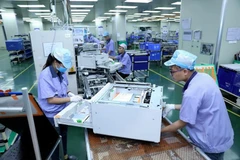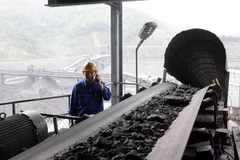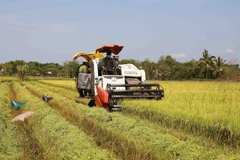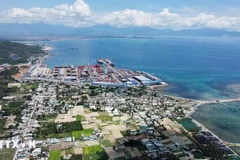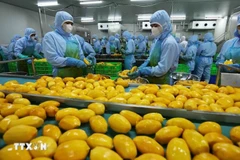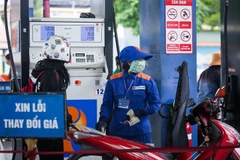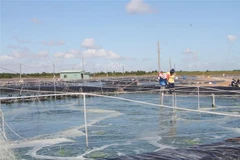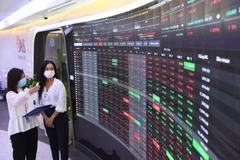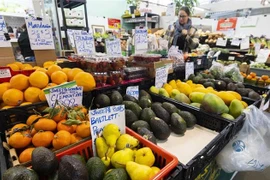Hanoi (VNA) - The World Bank (WB) has issued an update on Vietnam's first quarter macroeconomic situation with a key recommendation to closely monitor inflation.
In Vietnam's macroeconomic update for April 2022, the WB reported key positive signals that included the number of recorded COVID-19 infections and related deaths began to decrease in March. The Vietnamese economy showed an increased industrial production index and total retail sales continued to recover.
However, WB experts also recommended that Vietnam closely monitor inflation developments.
Industrial production, retail recover
According to WB, the index of industrial production of Vietnam increased by 8.5 percent year-on-year in March, equivalent to the pre-pandemic level. The most dynamic sectors include machinery, equipment, electronics, apparel, footwear, and beverages with all posting double-digit growth rates.
Besides, retail sales of consumer goods and services accelerated from 4.1 percent in February to 9.4 percent year-on-year, the second highest growth rate since the start of the COVID-19 pandemic. This recovery was partly due to the recovery of economic activities post-pandemic and was led by 10.7 percent growth in merchandise retail sales as compared with the same period last year.
However, revenue from consumer services grew at a slower rate of 4.8 percent compared to 7.5 percent year-on-year in February. This reflected an increase in revenue from consumer services. The slowdown in revenue from accommodation and catering services is related to the recent spike in COVID-19 infections.
Export and import of goods also increased by 14.8 percent and 14.6 percent respectively over the same period last year. The reported growth partly reflects rising import and export commodity prices as a result of soaring world commodity prices and supply chain disruptions due to the COVID-19 pandemic. These problems were exacerbated by war in Ukraine. Exports of textiles and garments, footwear, computers and electronics remained strong, increasing by 13.9 percent and 13.5 percent respectively in March, equivalent to the same growth rate in February.
In contrast, the export growth of machinery and equipment was only 3.9 percent, the lowest level in the past two years, due to a decrease of 3.6 percent in exports to the US.
Another bright spot mentioned by the World Bank is that registered FDI reached 3.9 billion USD in March, up 35.2 percent over the previous month, but 15.2 percent lower than a year ago. This is a promising development, showing that Vietnam is still an attractive destination for FDI inflows. Two-thirds of the total registered capital is investment in new business facilities by new businesses, including a toy factory project worth 1.3 billion USD.
Monitoring inflation closely
According to the report, the consumer price index (CPI) in March increased by 2.4 percent year-on-year compared with an increase of 1.4 percent in February. This is the highest inflation rate in the past seven months, but still well below the target of 4.0 percent. Petrol prices increased by 13.4 percent month-on-month and 56.1 percent year-on-year due to soaring world oil prices related to the war in Ukraine. Petrol continues to be the main factor contributing to inflation by increasing the transport price index. Food prices also inched up after being relatively stable in 2021.
According to WB experts, the increase in consumer prices and producer prices requires close monitoring of domestic price movements. Rising inflation will affect the recovery of domestic consumption and economic growth.
Although CPI growth is slow in 2021 in part due to weak aggregate demand, the rise in intermediate and producer prices in the last three quarters could influence production decisions and drive up consumer prices, especially food prices.
In the short term, targeted policy interventions are needed to remove the impact of rising prices on people, especially vulnerable groups. The policy of temporary reduction of tax on petrol and oil recently issued by the competent authorities is such a short-term policy, the report clarified./.




